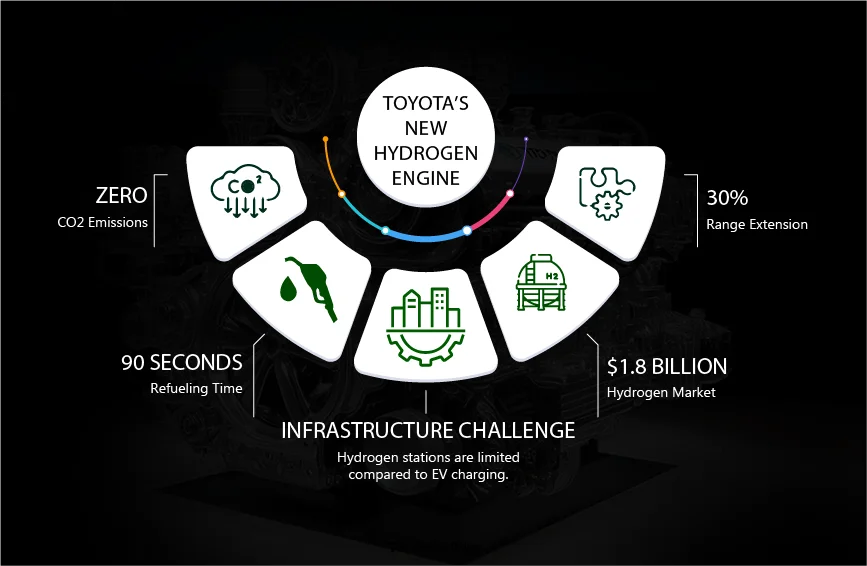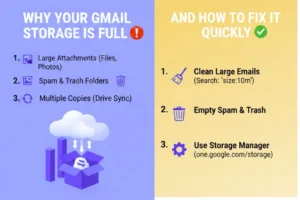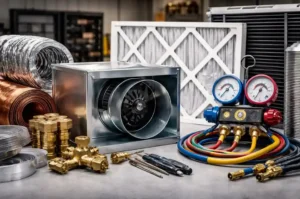Imagine a world where your car runs on hydrogen and emits nothing harmful into the atmosphere, no carbon dioxide, no pollution, just pure, clean energy. This is the vision behind Toyota’s new hydrogen engine. For years, Toyota has been quietly working on a project that could reshape the future of automotive engineering. Now, they’ve revealed a hydrogen combustion engine that claims to achieve zero emissions. But is this a revolutionary step, or are there significant hurdles?
The Science Behind Toyota’s New Hydrogen Engine
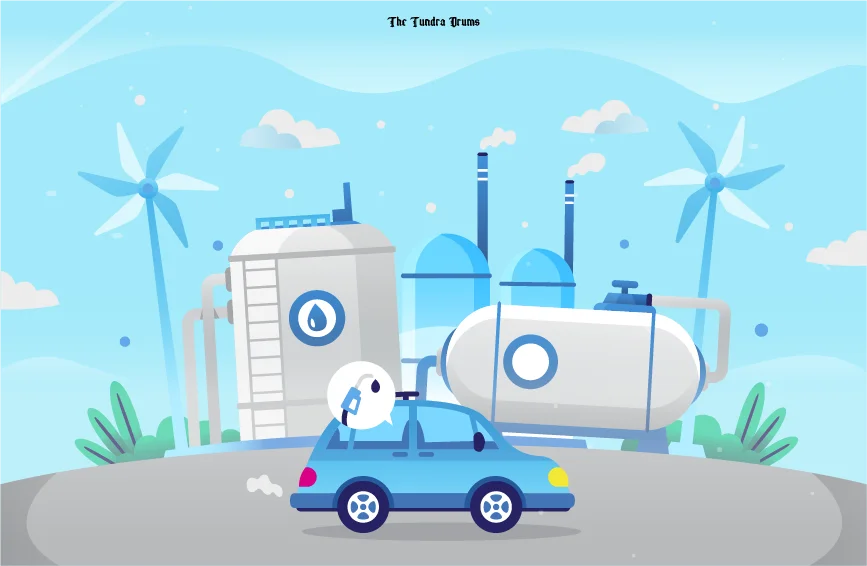
Toyota’s hydrogen engine operates similarly to traditional internal combustion engines but with one critical difference. It burns hydrogen instead of gasoline. Here’s how it works:
- Hydrogen is mixed with air inside the engine’s cylinders.
- A spark plug ignites the mixture, triggering a controlled combustion.
- This controlled explosion powers the vehicle without releasing harmful carbon emissions.
While this is impressive in theory, hydrogen combustion depends heavily on efficiency, which may not yet match the energy density of traditional gasoline or battery-electric systems. Despite this, the hydrogen engine performs with the same intensity as conventional engines, offering 24% more power than electric vehicles (EVs). However, hydrogen combustion still faces challenges like infrastructure limitations and hydrogen production costs.
| Key Feature | Toyota’s Hydrogen Engine | Traditional Gasoline Engine |
| Fuel | Hydrogen (combusted with air) | Gasoline (combusted with air) |
| Emissions | Zero CO2 | Significant CO2 emissions |
| Refueling Time | 90 seconds | 5-10 minutes for standard gasoline |
| Power Increase | 24% more power compared to EV engines | Comparable but emits CO2 |
| Torque Enhancement | 33% more torque for improved handling | Lower torque efficiency in comparison |
| Range Extension | 30% increase in range | Varies but typically less efficient |
How does the New Hydrogen Engine of Toyota Change the Automotive Industry?
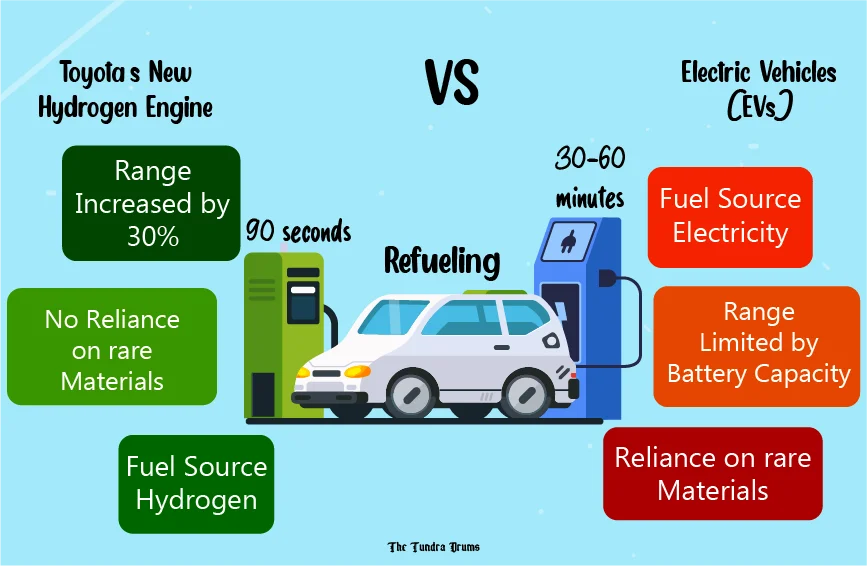
Toyota has long been a leader in sustainable automotive technology, especially with the success of its hybrid vehicles. By 2023, Toyota sold 33.4 million hybrid electric vehicles globally. While hybrid technology has contributed significantly to emission reduction, Toyota’s hydrogen engine represents a more ambitious leap toward achieving zero-emission transportation.
However, the road to revolutionizing the auto industry is steep. The global hydrogen vehicle market was valued at $1.8 billion in 2023, with a projected growth rate of over 28% between 2024 and 2032. Yet, hydrogen infrastructure development lags. Hydrogen refueling stations are limited compared to the rapidly expanding electric vehicle charging network.
Regarding vehicles, the hydrogen market is split between passenger cars and commercial vehicles. Passenger cars alone made up over 67% of the market in 2023, further highlighting the massive potential for Toyota’s new hydrogen engine to capture this growing segment.
| Feature | Toyota’s New Hydrogen Engine | Electric Vehicles (EVs) |
| Fuel Source | Hydrogen (burned in a combustion engine) | Electricity (stored in batteries) |
| Refueling/Charging Time | 90 seconds | 30-60 minutes, with fast charging reaching 80% in 30 minutes |
| Range | Increased by 30% in a new prototype | Limited by battery capacity |
| Sustainability | No reliance on rare materials like lithium | EV batteries require lithium, cobalt, and nickel |
| Infrastructure | Limited hydrogen refueling stations | Expanding charging network |
Challenges to Widespread Adoption:
- Infrastructure: Hydrogen refueling stations are scarce compared to the growing network of EV chargers.
- Cost: Hydrogen fuel production is energy-intensive and expensive, requiring long-term investments.
Potential Industry Shift:
- New Jobs: Expanding hydrogen infrastructure could create new job opportunities in production, refueling, and maintenance.
- Sustainability: Hydrogen cars offer a greener solution by eliminating dependence on rare materials and reducing carbon emissions.
Toyota’s New Hydrogen Engine Tested in Motorsports
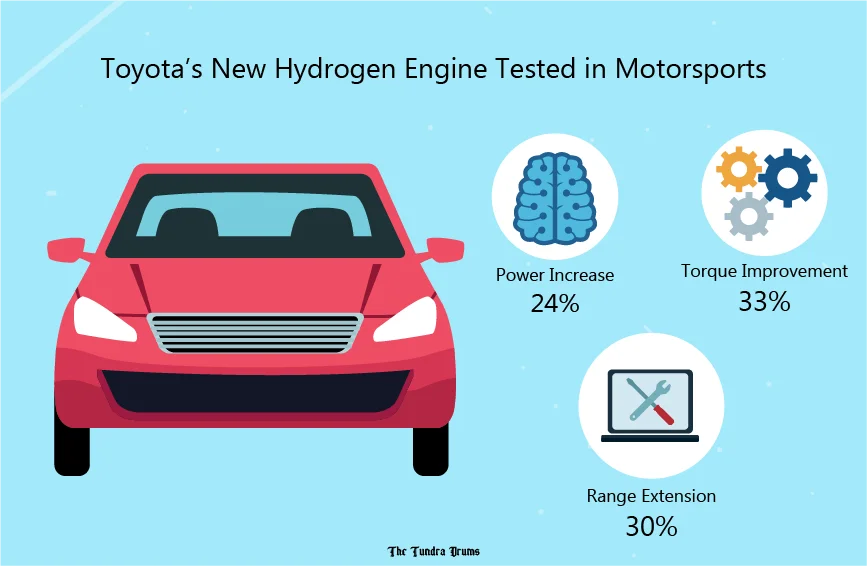
One exciting aspect of Toyota’s hydrogen engine development is its testing in motorsports. Toyota’s hydrogen-powered GR Corolla H2 participated in Super Taikyu endurance races, where it performed under extreme conditions:
- Power output increased by 24%.
- Torque improved by 33%, providing better handling.
- The driving range jumped by 30%.
While these advancements are promising, real-world driving conditions could reveal different challenges. Factors like extreme weather, daily commutes, and regular maintenance could present issues that motorsports environments don’t highlight.
The Road Ahead for Toyota’s New Hydrogen Engine
Toyota’s hydrogen engine is still in the testing phase. The company estimates it is about 40% of the way to achieving a commercially viable hydrogen combustion engine. Extensive testing, including extreme weather conditions in northern Japan, is ongoing.
| Development Stage | Toyota’s Hydrogen Engine |
| Development Progress | Approximately 40% toward market readiness |
| Testing Conditions | Currently undergoing winter and extreme weather testing |
| Market Launch | Targeted for medium-term, pending successful testing |
Will Toyota’s Hydrogen Engine Overtake EVs?
Predicting whether Toyota’s hydrogen engine will surpass EVs is difficult. Hydrogen combustion offers the advantage of quick refueling and avoids reliance on rare materials. However, EVs have a head start in infrastructure, affordability, and market demand. Without significant investments in hydrogen infrastructure, hydrogen-powered vehicles may struggle to compete with EVs shortly.
Final Verdict
Toyota’s new hydrogen engine is an ambitious step toward zero-emission vehicles but faces significant challenges. The technology shows great potential with fast refueling and improved performance, but its adoption will depend on hydrogen infrastructure development and fuel production cost reductions. In contrast, electric vehicles are benefiting from expanded infrastructure and falling costs. As Toyota continues its development, the future of hydrogen-powered vehicles remains uncertain, leaving the question of whether hydrogen can truly revolutionize the auto industry.






